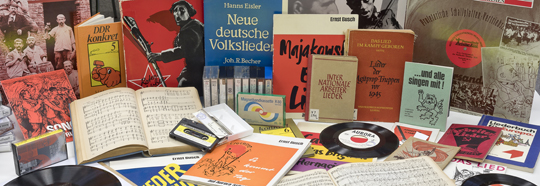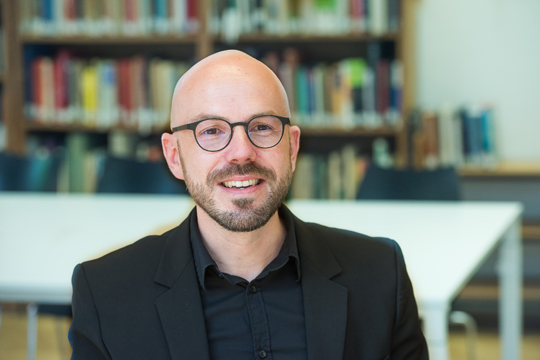Making work culture tangible
Freiburg, Aug 10, 2017
The state initiative „Niche Fields“ supported by the Ministry of Science, Research and Art Baden-Württemberg (MWK) funds fields with a low number of students or few nationwide university departments. The goal is to ensure the fields’ viability. Three Freiburg projects running for two years are being supported in the area of education. Julia Dannehl spoke with the initiators and is introducing their efforts through this series.

Researchers can detect what meaning people give the work world using inventory about workers’ songs in the Center for Popular Culture and Music at the University of Freiburg. Photo: Jürgen Gocke
The project “Learning, Researching and Teaching through Networks: Working in a Collective” was created by Prof. Dr. Markus Tauschek from the Institute for Cultural Anthropology and European Ethnology together with partners from Tübingen, Stuttgart, Karlsruhe and Staufen. The collaboration of collection-oriented and research institutions has made it possible to use pre-existing collections as a resource for teaching and knowledge transfer. The funding is about 250,000 Euros.
Herr Tauschek, you are professor for European ethnology. What makes your “niche field” so special?
Markus Tauschek: First off, what makes our field so special is that we are interested in people’s everyday lives. How do people live? What meaning do they give themselves? How do they act and interact with others? We observe its entirety with a historic perspective and ask, for instance, where cultural expressions originate and how they have developed over time. Oftentimes the question then arises why we act today the way we do. We have an equal interest in popular culture – the culture of many – in everyday culture and material culture, that is the meaning of objects and the way people deal with them.
According to the differences in research topics are there other research methods as well?
The field works traditionally with historic, archived materials with the objective to better understanding historic living environments and past everyday culture --- and that is exactly what we aim to strengthen and build out in the funded project. In particular, our focus will be on the way data is collected in present-day research. We will work, among other things, with participatory observation. That means we will interact with people, participate in cultural practices, record our own observations and impressions and augment the whole thing with interview research. A particular characteristic we have is the high level of self-reflection; that is, thinking about how our academic findings depend a great deal on the way in which we gather data.

What makes cultural anthropology and European ethnology so special is the interest in people’s everyday lives, says Markus Tauschek.
Photo: Klaus Polkowski
How would you characterize the funded project?
The special aspect of the project is our collaboration with external, non-university research and collection institutions. Our project partners include the Department for Historical and Cultural Anthropology at the University of Tübingen, the Center for Popular Culture and Music (ZPKM) at the University of Freiburg and two state divisions for anthropology that are attached to the respective state museums in Stuttgart and Karlsruhe. These divisions, for instance, contain unbelievably valuable historic inventory about everyday culture in the respective parts of the state, meaning Württemberg and Baden: inventory about historic popular culture, rural life, work culture, etc. During the funding period we wish to look mostly at the inventory regarding work. We believe that work today is an unbelievably relevant topic. And a look back in time could help us understand how we value work today.
This is a teaching project. That means that students are required to conduct scientific studies about the inventory?
Exactly. We will offer research-oriented seminars. Both undergrads as well as grad students will be able to conduct research on smaller inventory. It is possible, for instance, to take a look at the documents about workers from the 19th century in the archive and inquire about the effects of industrialization in Baden-Württemberg. The ZPKM has a large inventory of workers’ songs, which could be another possible research project. The students should learn how to work with the material as soon as possible and to present it for greater public consumption.
So there won’t be any papers or assignments?
We want to explore more innovative ways of transferring knowledge, which, along with gather research experience as early as possible, is another goal of our project. We could image establishing a blog, for instance, in which students present their research findings or smaller exhibits at the respective institutes and divisions. It is also conceivable that we put together a larger exhibit of all the project participants. But the students also have the opportunity to find topics in the archives and collections that have yet to be discovered for, for instance, their thesis work.

